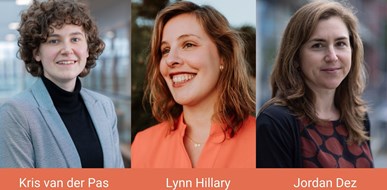[Interview] 'Interdisciplinary research in international migration law isn't being done enough'
Published 25 April 2022By Kaya van der Horst

In anticipation of their upcoming workshop on 19 May 2022, Kaya van der Horst sat down with the workshop’s co-organizers Kris van der Pas (Radbound University), Lynn Hillary (University of Amsterdam) and Jordan Dez (Vrije Universiteit Amsterdam) for a conversation on the state of interdisciplinary legal research on migration.
The workshop, titled “Interdisciplinary legal research on migration and the human rights of migrants,” will take place from 10:00-13:00 as a hybrid event, with the opportunity to physically attend at Radbound University Nijmegen or online via Zoom. Interested participants can sign up by sending an email to kris.vanderpas@ru.nl before 01 May 2022.
What prompted you to convene this workshop?
Jordan: We came up with the idea during a meeting of the ‘Migration and Borders Working Group.’ We were talking about what we, as a group, want to do since we are all using different methods. There’s a need for us to get in touch with senior researchers who are also doing interdisciplinary research because we don’t necessarily have them in our supervision teams. In general, we need to create a conversation that we can join. And then we all volunteered to organize it.
Kris: Just to add to that, a lot of the [working] group members are also doing interdisciplinary research, but we don’t have a forum to talk about it. Indeed, we informally discuss it, but don’t have a formal way of discussing which methods people are using. This workshop is also good for people who want to branch out, or perhaps use these interdisciplinary methods in future research. Right now there’s no real format, go-to-person or conference on interdisciplinary legal research on migration, so this workshop aims to fill that gap.
Lynn: The thing I really like about the working group is that we’re doing it for our own community. We’re doing it because we’re legal researchers who want to branch out in their own methodology, but then, we are still doing legal research. If you want to go to social sciences, there’s plenty of fora to go to, but there’s no real fora that brings the social science methodology together and explains how to incorporate that into the legal research. So we wanted to make the workshop very tangible and practical for ourselves, as well as for our peers.
Why is it important to undertake legal research on migration and migrant’s human rights with an interdisciplinary approach?
Jordan: I know for my own research, one of the reasons interdisciplinary research is so important is because of the exclusions of undocumented migrants from the personal scope of human rights protection. This exclusion leaves open the question, “What’s happening when you exclude people from the law?”. People still exist, and often live in a state of vulnerability, and I feel like when you use interdisciplinary methods, you can look at those spaces that the law maybe can’t look at fully. Only looking at the law leaves you confined by the state and its sovereign right to exclude. So for migration, I know for my research it’s particularly compelling to use an interdisciplinary approach.
Lynn: Yeah, and I think in a more general sense migration law is particularly focused on the law that flows from policy. Like Jordan was saying, that includes certain people and excludes others. I think what interdisciplinary methods may do is to start laying bare that exclusion. It allows us to think in legal terms, how to make the law better.
Kris: In general, interdisciplinary research in law isn’t being done enough. We focus so much on law in the books and black letter law, but there’s so many more practical components concerning what it does to people. I think only now there is starting to be more attention and momentum for interdisciplinary research, especially in migration.
Jordan: Migration is a very interdisciplinary field in general: There’s people coming from social sciences to law and vice versa. It’s a huge subject area that calls many different scholars to it and is very open to interdisciplinary inquiry.
Why is it important to undertake interdisciplinary legal research now? What recent developments in European migration law or European patterns of migration necessitate this turn to an increasingly interdisciplinary approach?
Kris: Well, a lot of our PhD colleagues are doing interdisciplinary research so I think there’s also a lot more money flowing: There are a lot of grants given to researchers who incorporate an interdisciplinary approach into their research projects, which then prompts PhDs to incorporate more interdisciplinary approaches. It’s kind of this snowball effect with more money flowing towards this type of research. There’s also much more cross-fertilization of different disciplines: People are realizing that as a sociologist of law you can look at the same things as a legal scholar, but we weren’t communicating with each other. We were in separate disciplines and were not talking to each other. I think now we’re realizing that we can benefit from having these inter-disciplinary conversations. I think these PhD projects or other legal researchers are realizing they can master different disciplines and use it in their research.
Lynn: I think it goes both ways: As a lawyer you can choose to incorporate any social science method in your legal research, or you can as a lawyer use your legal background to do social sciences. And that, I think is very interesting. I believe we are at the beginning of that evolution in Dutch legal research.
Kris: To emphasize, I do think it’s important to have that conversation on how to do interdisciplinary legal research--that’s why the workshop is there. It’s not like we should take an unrestrained pick-and-choose approach with the attitude ‘You can do whatever you want and we can do everything.’ I think it’s important we realize that we need to learn about how to undertake this research and also be transparent about it. Legal research is not very good about methodology in general.
Lynn: That’s a good point Kris. It’s not just about interdisciplinary research, but about methodology as well, and what we want to do as legal researchers.
Jordan: The question “How do you circle back to the doctrine?” is also important. It feels like this one big question that’ll never have one answer. That question must be taken seriously: We can’t just say, “Oh because it’s empirically so, then it must be doctrinally so.” That translation of empirical data in law needs to be taken seriously--It’s part of the methodology. The translation is also contextual for every research question. The way you answer this research question is also different if you’re using a socio-legal method, an anthropological approach or something that is more empirical legal studies-related and grounded in positivist science.
How widespread is the use of interdisciplinary approaches in legal research on migration within academia?
Jordan: I think, based on my own experience in this legal faculty [at Vrije Universiteit Amsterdam], there is an increase in the use of interdisciplinary methods. Now PhD students particularly are really incorporating interdisciplinary methods into their research.
Kris: I think that in national law, legal research still has a very doctrinal and dogmatic focus. I second Jordan, though, in that there are a lot of new PhDs who are starting to look into empirical legal research. Here, I sometimes try to warn them about how much work empirical legal research requires and how time-consuming it is—It’s not something for a positivist legal researcher to just include as a nice side study. You can do it, but you need to embed it in your research and it needs to have a purpose. It needs to serve a purpose in your overall project.
Lynn: Maybe that’s something we’re also all wary of: You don’t want to do empirical legal research, simply because it might bring in money. You want to do it because it’s necessary for your research question and what you’re looking at. I think that’s also where we as legal scholars can add something to social sciences: We can circle back to doctrinal research. The kind of research that does three interviews, just for the sake of doing interviews, is completely useless if you ask me. There is an added benefit, but that too needs to be made explicit.
Jordan: The main question is: Is an empirical study necessary to answer your research question? It takes so much time to do empirical work. If it’s necessary to answer the research question, then do it and do it well. That’s the cautionary tale that comes with this workshop.
Kris: I think it’s funny that we ended up here because we are noticing this development of increasing interest in interdisciplinary legal research, but we’re also cautious. Still, I think it’s good to have conversions about this, which is the purpose of this workshop. We need to continue this conversation on conducting interdisciplinary legal research.
What do you hope will be the main takeaway from this workshop?
Lynn: I think we hope that participants are excited about doing interdisciplinary research, but that they also take all the afore-mentioned cautionary tales with them.
Kris: Hopefully participants also understand that there’s no all-size-fits-all for doing interdisciplinary legal research, but that there are rather a lot of different ways to do it.
Jordan: Another goal is creating this community of interdisciplinary scholars and putting people in touch with each other from different universities. The goal is to create dialogues that we can keep going in the future.


